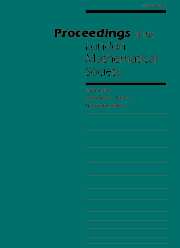Article contents
THE CONE OF CLASS FUNCTION INEQUALITIES FOR THE 4-BY-4 POSITIVE SEMIDEFINITE MATRICES
Published online by Cambridge University Press: 01 July 1999
Abstract
A function $f$ from the symmetric group $S_n$ into $\Bbb R$ is called a class function if $f(\sigma ) = f(\tau )$ whenever $\tau$ is conjugate to $\sigma$. Let $d_f$ be thegeneralized matrix function associated with $f$, mapping the $n$-by-$n$ positive semidefinite Hermitian matricesto $\Bbb R$. For example, if $f(\sigma ) = \mbox{sgn}(\sigma )$, then $d_f(A) = \det A$.
We consider the cone $K_n$ of those $f$ for which $d_f(A) \geq 0$ for all $n$-by-$n$ positive semidefinite Hermitian matrices. For $n = 4$ we show that $K_n$ is polyhedral, and explicitly find the extreme rays. Equivalently, $f$ belongs to $K_n$ if $d_f(A) \geq 0$ for a finite minimal set of ‘test matrices’. This solves a problem posed by Gordon James. As a corollary, we characterize all inequalities involving linear combinations of immanants on the positive semidefinite Hermitian matrices of order $n = 4$.
We obtain similar results for 4-by-4 real positive semidefinite matrices.
- Type
- Research Article
- Information
- Copyright
- London Mathematical Society 1999
- 5
- Cited by


